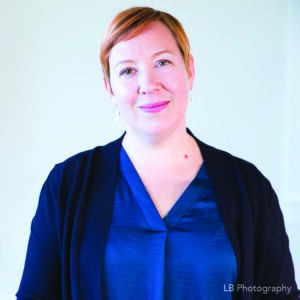by Sarah Rutledge Fisher | photo courtesy of Parrish Oglesby
For people in the greater Memphis area who are living with or at risk of contracting HIV/AIDS, Parrish Oglesby is
a kind of behind-the-scenes superhero. He wakes each day and puts on the suit and tie of a charismatic government employee, but underneath he wears the bold insignia of a warrior in the fight for HIV care and prevention.
Oglesby, along with his fellow warriors at H-CAP, Memphis’s HIV Care and Prevention Group, do daily battle against the forces of poverty, stigma, and lack of HIV education that have led Memphis to have one of the highest infection rates in the country. For weapons, Oglesby and crew wield a complex web of federal and state bureaucracy powered by funds from the Ryan White Project to ensure that HIV/AIDS services are safely and efficiently provided to those in need. (For more information on H-CAP, see [HCAP of Memphis, page 16-17)
Nearly every superhero has a tragic backstory—an unnecessary loss that won’t let them turn away from the good fight. In this regard, Parrish Oglesby is no different. In 1984, Oglesby had just come home from high school football practice. His mother was in the kitchen cooking dinner. She turned around and told him that his uncle, Marvin Oglesby, had AIDS. Oglesby was devastated. He adored his uncle, and at that time, an HIV diagnosis was a certain death sentence.
Oglesby assumed that, because his uncle was a veteran, he would get better care than most. But when Oglesby accompanied his mother to the hospital, he couldn’t believe the state in which he found his uncle. Oglesby’s uncle was isolated on one side of the hospital away from everyone else. He was neglected, covered in filth, alone.
“No one wanted to touch him. No one wanted to clean him up. None of the nurses wanted to get near him,” Oglesby remembers. His mother Cynthia would come to the hospital nearly every day, put on gloves, and clean and care for his dying uncle. The experience would stay with him for the rest of his life.
Oglesby was a talented young man and soon discovered his superpowers—a gift of gab, leadership skills, marketing ability, and a drive for success. These skills paved his way through school and into the working world. The poverty of his youth had given Oglesby a hunger for financial achievement, which he met as a highly successful stock broker and then finance project manager. He had a successful career, a wife, and a family, but the cycle of earning money and acquiring things began to wear thin. A self-serving life was no longer satisfying.
His wife suggested he check out a finance position that had become available with the Shelby County Government, but when Oglesby pulled up the website, the Ryan White Program Planning Manager position grabbed his attention. Ryan White was an Indiana teenager who contracted HIV during a blood transfusion in the mid-1980s, right around the time Oglesby’s uncle was dying. White was expelled from school after contracting HIV/AIDS and became the national public face for HIV/AIDS discrimination. In 1990, only months after White’s death at the age of 18, Congress passed the Ryan White CARE act (since renamed the Ryan White HIV/AIDS Treatment Extension Act). The Ryan White Act created a federal program that funds medical and support services for people living with HIV/AIDS and their families. Oglesby had no prior experience but though he had the right skill set to make a difference. Mostly, he just knew that he wanted to be involved.
In the interview, Oglesby’s future boss, Administrator Jennifer Pepper, asked a question he had never been asked before. “Why shouldn’t I hire you for this position?”
Oglesby was caught off guard. He took a moment to think.
“It’s not about me,” he answered. “If you could find somebody who could do the job better than me, who cares more than I do, who is going to be a bigger advocate for the people who need this help, you should hire them. You should not hire me.”
Of course, she did hire him. These days, as Planning Manager of the Shelby County Division of Community Services/Ryan White Part A Program Office, Oglesby primarily runs H-CAP, the HIV Care and Prevention Group that assesses and prioritizes needs in area HIV care and prevention and coordinates allocation of available funds to appropriate service providers. He sees his job as much more than mere resource allocation. It is his daily privilege to give a voice to a community that for so long has been robbed of a seat at the table.
Oglesby tells a story about being the keynote speaker at a young black gay organization. He walked into a room full
of young black gay men all in their late teens or early twenties. Before taking the stage, Oglesby walked among them shaking their hands and greeting them. By the time he took the stage he was furious. The young men could tell that Oglesby was not gay, and every single one of them had looked down at his feet as Oglesby approached. He began his speech with an apology for making them feel that way. He knew, he told them, what it felt like to be bullied.
“I’m a a heterosexual male,” he says, “but I am in the fight, and they need to see more heterosexual men in the fight for them.”
Oglesby goes home each night with the satisfaction of the good fight. He ends each day knowing that he helped someone who needed help. His only regret is that he wasn’t doing so all along.
“I feel like I’m fighting for the right thing. I’m in this fight for the right reasons. I am serving my community. I am giving back. Every single day Marvin Oglesby is looking down at me and saying he’s proud of me.”




